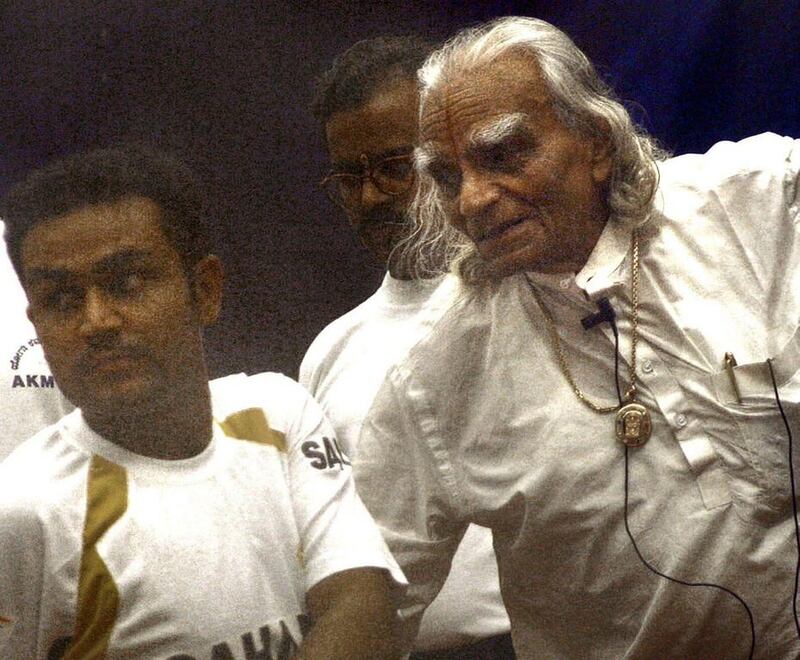NEW DELHI // BKS Iyengar, the Indian yoga guru credited with helping to fuel a global explosion in the popularity of the ancient spiritual practice, died on Wednesday aged 95.
Mr Iyengar started his yoga school in 1973 in the western city of Pune, developing a unique form of the practice that he said anyone could follow.
He trained hundreds of teachers to disseminate his approach, which uses props such as belts and ropes to help novice practitioners achieve the poses.
He wrote many books on yoga, which has been practised in Asia for more than 2,000 years, and has in recent decades become hugely popular around the world.
His insistence on perfecting the poses – or asanas – won him a huge following, among them celebrity fans ranging from the cricketer Sachin Tendulkar to the writer Aldous Huxley.
It was an encounter with the violinist Yehudi Menuhin, who met Iyengar during a trip to Mumbai in the 1950s, that prompted his move to take his practice global.
“Perhaps no one has done more than Mr Iyengar to bring yoga to the West,” said the New York Times in a 2002 profile of the guru.
“Long before Christy Turlington was gracing magazine covers, decades before power yoga was a multimillion-dollar business, Mr Iyengar was teaching Americans, among others, the virtues of asanas and breath control.”
A US model, Turlington famously graced the front cover of Time magazine in a cross-legged pose for a 2001 report on the explosion in yoga’s popularity.
In 2004, the magazine named Mr Iyengar one of the 100 most influential people in the world.
Critics say the global expansion of yoga into western gyms and fitness centres has taken the practice too far from its spiritual origins.
But Mr Iyengar said it was unfair to blame yogis. “It all depends on what state of mind the practitioner is in when he is doing yoga,” he said last year in an interview with the Indian newspaper Mint.
“For the aberration, don’t blame yoga or the whole community of yogis.”
Mr Iyengar died in hospital early on Wednesday after suffering kidney failure, the Press Trust of India news agency said.
His website carried a picture of Mr Iyengar’s smiling face beside a message that read: “I always tell people, ‘live happily and die majestically’ 14-Dec 1918-20 Aug 2014.”
Despite suffering a heart attack at 80, he had continued to practise yoga into his nineties.
He suffered from ill health as a child, but found that he could improved his strength by practising yoga, which he took up as a teenager.
When he was 18, his guru sent him to teach in Pune because he spoke some English. There, he developed his own form of yoga, eventually opening his own institute.
There are now more than 100 Iyengar yoga institutes around the world.
India’s information minister, Prakash Javadekar, said Mr Iyengar had “made Pune the capital of yoga and spread it all over the world”.
Prime minister Narendra Modi, a yoga lover, tweeted that he was “deeply saddened” by the guru’s death.
“Generations will remember Shri BKS Iyengar as a fine guru, scholar & a stalwart who brought yoga into the lives of many across the world,” he said.
Mr Iyengar is survived by a son and a daughter. He was to be cremated on Wednesday afternoon.
* Agence France-Presse





